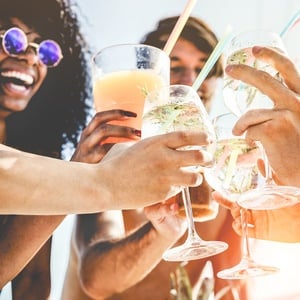
Alcohol-free drinks are increasingly consumed in an effort towards more mindful drinking. "Booze without the booze" is a movement that’s growing globally, and South Africa, which ranks sixth globally as a nation of drinkers, is also slowly joining the movement. And if you want to stay off alcohol, you have plenty of options to choose from as there are already several popular brands on the market.
Food24 notes that the 0% beer category is potentially the biggest trend in beer since the introduction of the Lite category several years ago. But while these beverages have been designed to emulate the traditional taste of alcoholic drinks, there are a few important factors to bear in mind:
Are they really 100% alcohol-free?
Not always. According to the South African Liquor Products Amendment Bill, an alcoholic beverage is labelled as such when it contains no more than 0.5% alcohol by volume.
There are many "alcohol-free" drinks that claim to offer the same taste as their alcoholic counterparts, but without the alcohol, Rhys Evans, Managing Director of ALCO-Safe notes, adding that the label and marketing are misleading, as quite a few products contain around 0.3%–0.5% alcohol.
“Many alcohol-free wines also contain trace amounts of alcohol as they have been ‘de-alcoholised’ – comparable to decaffeinated coffee which still contains traces of caffeine,” explains Evans. Non-alcoholic drinks can also still play a role in contributing to liver damage. The University of Wisconsin Hospital & Clinics Liver Transplant Program therefore recommends refraining from alcohol-free wines altogether.
Can non-alcohol drinks trigger a breathalyser?
Since the percentage of alcohol in these drinks is so incredibly low, Evans comments that even if you consume multiple drinks, you are unlikely to blow a positive result on a breathalyser.
However, if you, for example, consume twenty 330ml Savanna Non-Alcoholic ciders within an hour, the drink, which contains 0.3% alcohol, could put you over the legal limit. For this reason, the advertising regulator ruled earlier this year that television advertising must reflect this information, reports Business Insider.
Health24 reached out to Distell, which owns Savanna, and was told that the company was the first to introduce a non-alcoholic cider to the South African market and it was simply a means of responding to the "evolving consumer needs, in particular, moderation and responsible drinking".
"Our labelling for alcohol and non-alcohol products complies with all applicable regulations. In particular, non-alcoholic products are classified in the Foodstuffs Act as a product with the alcohol level above 0.05% but under 0.5%. Currently, Distell has two non-alcoholic offerings on the market: Savanna Non-Alcoholic Lemon and the JC Le Roux non-alcoholic range," they said.
But on a more serious note, these drinks can actually be dangerous for recovering alcoholics.
Trigger for recovering alcoholics
Sobriety can be tough. For many recovering alcoholics, it’s a hotly debated question, but Evans explains that alcohol-free beverages are a "big danger zone".
“Even small amounts of alcohol can be dangerous to an addict, but it goes beyond the simple presence of alcohol.
“Alcoholism is more than a physical addiction – it is also a mental addiction, and force of habit plays a significant role.”
The similar smell, taste, and even the shape of the bottle or glass of the non-alcohol drinks could all be triggers for recovering alcoholics and could cause a relapse, adds Evans.
“For some alcoholics, just the act of holding a wine glass could prove to be problematic, even if the glass contained something as innocuous as fruit juice.”
Hence, despite the shift to mindful drinking habits, Evans advises that it's best for people in recovery to stay away from this “dangerous territory”.
Bearing this in mind, Distell responded to their role in promoting responsible drinking:
"Importantly, our commitment to responsible drinking is unwavering. We respect the rights of adults who choose whether or not to consume alcohol or non-alcohol products.
"As Distell, we run and fund several campaigns aimed at promoting responsible drinking and educating consumers on the dangers of alcohol abuse, and we remain committed to the guidelines prescribed by Government to address its concerns about alcohol-abuse-related harm, and the South African alcoholic beverages industry," the company said, adding:
"While we are very excited and encouraged by the appeal and continued interest in our non-alcoholic products, at the same time, our position around the importance of drinking responsibly has not and will not change. We are taking additional steps to convey and drive home the responsible drinking message. One of them is a brand-led educational campaign on traditional and social media platforms to explain what it means if a product is classified as non-alcoholic."




 Publications
Publications
 Partners
Partners











